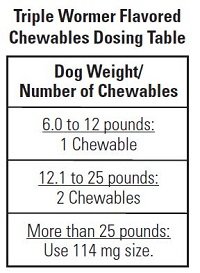Triple Wormer
Generic name: pyrantel pamoate and praziquantel chewable tablets
Dosage form: FOR ANIMAL USE ONLY
On This Page
Package contents:
blisters of 2 or 12
flavored chewables
Drug Facts
Active Ingredients
(in each chewable):
pyrantel pamoate (30 mg)
and praziquantel (30 mg)
Purpose: De-wormer for Small Dogs and Puppies Only (6.0 to 25 pounds).
Uses: For the treatment and control of:
• Roundworms (Toxocara canis, Toxascaris leonina)
• Hookworms (Ancylostoma caninum, Ancylostoma braziliense, and Uncinaria stenocephala)
• Tapeworms (Dipylidium caninum, Taenia pisiformis)
Human Warning:
Keep this and all medication out of the reach of children.
To obtain product information, including a Safety Data Sheet (SDS), call 1-800-821-5570.
When Using This Product:
• Consult your veterinarian for assistance in the diagnosis, treatment, and control of parasitism.
• Do not de-worm a dog or puppy that is sick. Consult a veterinarian for diagnosis of the illness.
• Triple Wormer
Flavored Chewables are safe for use in puppies 12 weeks or older and adult dogs.
Safety in breeding dogs and pregnant bitches has not been tested.
You May Notice:
Vomiting, loose stools (with or without blood) and decreased activity following treatment.
If you notice these signs, contact a veterinarian.
Directions:
Each flavored chewable contains 30 mg of pyrantel pamoate and 30 mg of praziquantel. The dose for each drug is 2.27 mg per pound of body weight (5 mg/kg). Please refer to the following dosing table for help finding the right dose for your dog.

• You should weigh your dog to make sure you are giving the right dose.
• Triple Wormer Flavored Chewables are palatable if offered by hand. If your dog does not voluntarily eat the chewable, you can hide the chewable in a small amount of food or place it in the back of the dog's mouth for forced swallowing.
• Make sure that the dog eats the complete dose.
• Watch your dog for a few minutes after dosing to make sure the chewable is not rejected.
Other Information:
Recommended De-Worming Schedule:
Consult your veterinarian for assistance in the diagnosis, treatment, and control of parasitism. De-worming schedules may vary depending on the climate where you live and the activity of your dog.
Re-treatment: Re-treatment of your dog may be necessary as determined
by laboratory fecal examination and/or if your dog is living where re-infections are likely to occur. Consult your veterinarian for assistance in the diagnosis and prevention of re-infection. In case of re-infection with tapeworms



